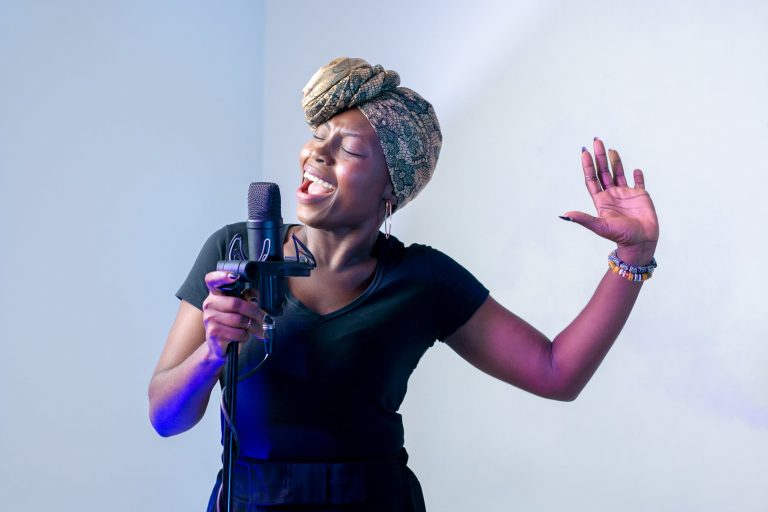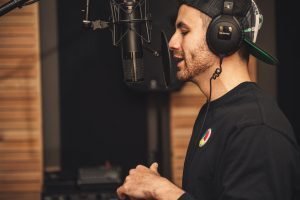There are a lot of different microphones out there on the market, and so many considerations to make before deciding which one is right for you.
The most important thing is to find a microphone that best fits your needs.
Do you need a mic with adjustable settings or one that has noise cancellation? The answers depend on which function you prioritize and your budget.
Table of Contents
How to Choose a Beginner Microphone For Singing
Type of Microphone
There are many types of microphones that do different things.
For example, there are condenser microphones (also called capacitors), dynamic microphones, and ribbon mics.
Condenser mics require phantom power to work; most dynamics contain their own power source, like a battery; and ribbon mics have no moving parts and don’t require phantom power.
Condensers are generally better for high-end vocals in a home studio setting because they pick up more detail than dynamics do and capture less room noise than ribbons.
Dynamics are better for drum sets or overheads because they’re much louder than ribbons or condensers (great on loud sources).
Ribbon mics are good at rejecting feedback due to their internal shielding.
And some mics are better for certain instruments, like the Shure SM57 for rock vocals and multi-track recordings.
But when choosing a mic, you might not know exactly what you need until you try them out at your sound or recording studio.
So get a video microphone that has (at least) good feedback rejection and has good sound isolating abilities.
The Shure SM58 is a great example of an all-around good mic with fantastic feedback rejection and noise reduction capabilities.
Use
Find a microphone that’s good for the thing you’re going to use it for. If you’re a singer, look for one with good noise cancellation.
If you’re going to be recording your own instrument or voice, find one that has a flat frequency response and good noise cancellation.
Recording Performances
Find a microphone that’s best for the kind of sound you’re looking for.
If you’re going to be singing in a basement, don’t get a condenser mic.
It’ll pick up too much noise and you’ll end up having to buy another one.
Ease of Use
Most mics come with an adapter that connects the mic stand to the microphone, but it’s not always easy to use.
Pick a mic that has a clamping holder which will prevent vibration and looseness when you’re playing and singing.
Balance Settings
You don’t want your voice too loud or too quiet!
When recording, make sure your mic is balanced properly so you don’t overdo it in post-production. Make sure the microphone has good sound isolation.
The Shure SM57 is great at this! You don’t want to hear anything else except your voice.
Find a microphone that’s easy to control volume and filter as necessary.
You don’t want to be adjusting levels during performances or after the fact in your studio.
Find a mic that has easy access and good controls so you can adjust volume and filters on the fly.
Low Self Noise
Self-noise is the humming sound from the microphone that you’ll hear in your recording if there’s any noise in your recording environment.
It makes for a bad recording or performance and can be avoided.
Find one with a balanced XLR connector (not unbalanced).
There’s not much difference, but unbalanced mics will have their own internal noise and it might make your recordings sound weird.
Below are some of the top beginner microphones for singing based on their quality, ratings, and versatility.
——————————————————————————————————————————————-
Related Guides:
——————————————————————————————————————————————-
8 Best Beginner Microphones For Singing
No products found.
1. Shure SM58
No products found.
The best beginner Shure SM58 microphone is the Shure SM58. This model has strong construction and sound, and it’s pretty durable as well. It also captures most sounds with accuracy which makes it easy to open up your vocals to the mic. It also has good feedback rejection, which means unwanted sounds are eliminated from being recorded.
The best microphone for singing is the Shure SM58. This microphone is popular among many musicians because it has a strong construction and sound, and it’s pretty durable. It also captures most sounds with accuracy which makes it easy to open up your vocals to the mic. It also has good feedback rejection, which means unwanted sounds are eliminated from being recorded.
The Shure SM58 can be used by both professionals and beginners alike due to its setup versatility, making this chosen option perfect for singers of all levels.
2. Audio-Technica AT2020
No products found.
The second choice for beginner microphones would be the Audio-Technica AT2020 Condenser Microphone at number two on this list; this model is perfect for those who don’t want to invest a lot of money into a microphone and who want to try out the recording process. The condenser element has good sound quality and can adjust to various sounds making it easy for you to sing along or record other instruments.
3. Behringer Ultravoice Xm8500
No products found.
At number three on this list would be the Behringer Ultravoice Xm8500; this model is perfect for those who want a more affordable option that can still deliver an amazing sound. The Xm8500 is great for home recording or small studio applications, as it is designed to provide a strong sound with high fidelity. It has a rugged build and can be attached to a stand or a microphone clamp. This mic is perfect for all types of voices, from sopranos to bass singers to altos.
4. MXL Mics 770
No products found.
At number four on this list is the MXL Mics 770; this mic is designed for those who want an easy-to use option that also produces decent sound quality. It has simple controls that make it easy to use, and it’s compact enough to fit in small spaces. The MXL 770 has a unique noise cancellation feature that many users love as well.
5. Samson Go Mic Portable
No products found.
At number five on this list is the Samson Go Mic Portable USB Recording Microphone; this microphone is perfect for those who produce music on the go. It’s small and lightweight, so you can easily travel with it without damaging it. It delivers a rich sound quality that users love, and it’s compatible with various recording devices including PCs, tablets, laptops, and smartphones.
6. Rode NT1-A
No products found.
At number six on the list is the Rode NT1-A ; this model is perfect for those who want a mic that is durable and has good sound quality. It has a long-lasting construction, so users love it for its durability. The Rode NT1-A also has a high-performance bass response, allowing you to sing with more resonance and clarity.
7. Blue Yeti
No products found.
At number seventh on this list is the Blue Yeti ; this is another option that’s perfect for singers who want a good mic that has exceptional sound quality. It offers four different pickup patterns, allowing you to choose one that fits your vocal style. This model also has great clarity, so you can record your voice without having to worry about unwanted sounds being picked up by the mic.
8. Sennheiser E835 Dynamic Cardioid Vocal Microphone
No products found.
Last on our list is the Sennheiser E835 Dynamic Cardioid Vocal Microphone; this is a good option for those who want a mic that effectively absorbs unwanted sound. It has a cardioid pickup pattern which provides excellent sound quality. The Sennheiser E835 also has a built-in pop filter, which is perfect for singers who tend to make loud noises from time to time. This model is perfect for multiple uses, as you can use it as a vocal or instrument microphone.
Related: Best SuperCardioid Mics Reviewed
FAQs
Which microphone is best for singing?
The Shure SM58 is one of the best microphones for singing. It is tough, durable and reliable.
This mic also has a strong build and can withstand a lot of use without breaking or showing any signs of wear and tear. It’s also affordable.
What is a good cheap microphone for recording vocals?
Some good microphones for recording vocals include the Blue Snowball Ice microphone, the MXL 770 Cardioid Dynamic Vocal Microphone, and the Samson R21 Large Diaphragm Condenser.
Does singing sound better using a microphone?
It is difficult to answer this question without hearing some singing.
There are a lot of advantages for using a microphone when singing.
A microphone can help the sound of your voice travel further.
Sound does not travel in a straight line, so even if someone is close to you and you don’t have a mic-enhanced voice, it will be difficult for the listener to hear your voice clearly.
Besides that, there are still people who don’t like loud voices – such as those who work nearby and those who have sensitive ears.
For these people, it would be unhelpful if they used a microphone while they were singing.
FAQ:
Q: What is the best mic for singing?
A: Please give an overall site rating:
Q: How to make a simple microphone at home?
A: screw base, into the cardboard taped to the glass tube. Tape the wire to the body of your DIY microphone then put a hole in your sponge. Set your mic over the hole in your sponge and join them to the cable in the glass tube. Take some glue and hold the wire with the mic in the sponge.
Q: How to set up a microphone for singing?
A: – Check Show in-meeting option to “Enable Original Sound” from microphone – Set Suppress Persistent Background Noise to Disable – Set Suppress Intermittent Background Noise to Disable
Q: What is the best microphone to use?
A: Microphone: Shure MV7. … Camera: DSLR or Mirrorless Camera. … Computer: Mac Mini M1. … Lighting: Elgato Key Light. … Mixer: Rodecaster Pro. … Green screen: Elgato Green Screen. … Extra monitor: Sidetrak. … Stream Decks: Elgato Stream Deck/Loupedeck Live. …




